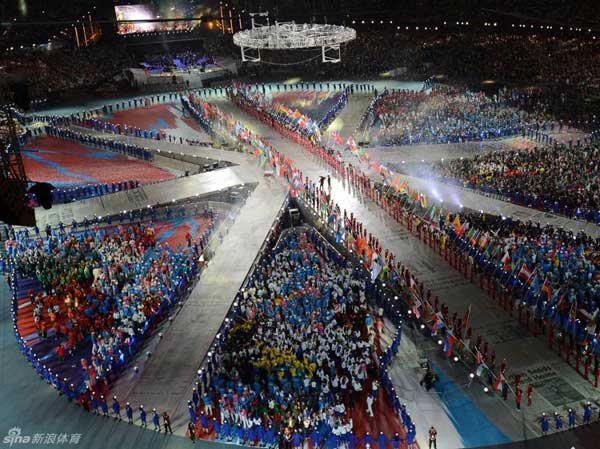Games over, time to party
 0 Comment(s)
0 Comment(s) Print
Print E-mail Xinhua, August 13, 2012
E-mail Xinhua, August 13, 2012
For the tens of thousands of athletes, who had shed tears and sweat to get to London, the Olympic Games are over and now it's time to party.
|
|
| Delegation flags, athletes enter the stadium at the closing ceremony. |
International Olympic Committee President Jacques Rogge closed the London Olympics over with praise for the athletes.
"Through your commitment to fair play, your respect for opponents, and your grace in defeat as well as in victory, you have earned the right to be called Olympians," he said, adding: "These were happy and glorious Games."
From Ray Davies, George Michael to the Spice Girls, London has called on Britain's most successful musicians to the weekend party to celebrate the end of 16 days of competition and exuberance.
The show, "A Symphony of British Music", included performances of 30 British hit singles from the past five decades -- whittled by artistic director Kim Gavin from a pool of 1,000 songs.
The London 2012, described by the organizer as "an athletes' Games", attracted 10,490 athletes from 204 countries and regions. A total of 44 world records and 117 Olympic records have been set at the games.
The host nation won a record 29 gold medals - Britain's best performance in more than a century - finishing third in golds. The United States beat China in both the number of gold medals and total medals, recapturing the top position it lost four years ago.
The Games witnessed the sensational moment when Jamaica's sprinter Usian Bolt smashed the world record, becoming the first athlete to win both the 100m and 200m in consecutive Games.
It also witnessed the tears when American swimmer Michael Phelps announced his retirement after becoming the most decorated Olympian with a total of 22 Olympic medals, out of which four gold medals and two silvers were won in London.
Britain's Chris Hoy, competing in his fourth Games, grabbed two golds of the cycling track race in London. Hoy's tears as he received his sixth gold medal were described by Rogge as a "defining image" of the Games.
For millions of Chinese, London also saw the heartbreaking moment as China's hurdler Liu Xiang limped down the track toward the finish line.
Four years ago after an Achilles injury denied Liu the chance of defending his Olympic 110m hurdles title in Beijing, tragedy struck again in London as the 2004 champion crashed into the first obstacle and fell to the track in his opening heat.
A new generation of heroes also step into the spotlight in London.
Chinese swimmer Sun Yang broke his own world record to make it a golden double at the London Olympics. British distance runner Mo Farah became a national treasure by sweeping the 5,000-meter and 10,000-meter races.
And then there was Oscar Pistorious, the double-amputee from South Africa running on carbon-fiber blades. And sprinter Manteo Mitchell, who completed his leg of the 4x400 relay semifinal on a broken leg, allowing his team to qualify and win silver.
The Games were prepared during difficult economic times. While trying to control the spending, the organizers had hoped the Games could create opportunities for the young and help boost the country's economy.
Boris Johnson, Mayor of London, said the legacy of the Games for London goes way beyond sport.
"Olympic investment has kickstarted the transformational renaissance in east London, bringing new jobs and new homes to the communities where they are most needed," Johnson said.
As the celebration came to an end, Johnson handed over the Olympic flag to Mayor of Rio de Janeiro, Eduardo Paes. The handover marks the first time a South American country will host the Olympic Games.
As the Brazilian anthem was played and the Brazilian flag was raised, the search for Rio 2016's heroes began.







Go to Forum >>0 Comment(s)